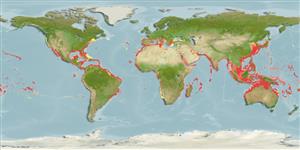Preferred temperature (Ref.
115969): 16.9 - 29, mean 27.1 (based on 3486 cells).
Phylogenetic diversity index (Ref.
82804): PD
50 = 0.5020 [Uniqueness, from 0.5 = low to 2.0 = high].
Bayesian length-weight: a=0.01622 (0.01235 - 0.02130), b=2.92 (2.84 - 3.00), in cm Total Length, based on LWR estimates for this species (Ref.
93245).
Trophic level (Ref.
69278): 4.5 ±0.0 se; based on diet studies.
устойчивость к внешним воздействиям (Ref.
120179): средний (среднего размера), минимальное время удвоения популяции 1.4-4.4 года (K=0.18; tm=4; tmax=15).
Prior r = 0.48, 95% CL = 0.32 - 0.72, Based on 1 full stock assessment.
Fishing Vulnerability (Ref.
59153): Moderate to high vulnerability (54 of 100).
Climate Vulnerability (Ref.
125649): High vulnerability (62 of 100).
